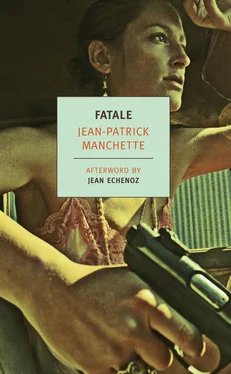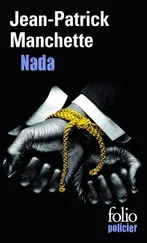Jean-Patrick Manchette - Fatale
Здесь есть возможность читать онлайн «Jean-Patrick Manchette - Fatale» весь текст электронной книги совершенно бесплатно (целиком полную версию без сокращений). В некоторых случаях можно слушать аудио, скачать через торрент в формате fb2 и присутствует краткое содержание. Год выпуска: 2011, ISBN: 2011, Издательство: New York Review Books, Жанр: Криминальный детектив, на английском языке. Описание произведения, (предисловие) а так же отзывы посетителей доступны на портале библиотеки ЛибКат.
- Название:Fatale
- Автор:
- Издательство:New York Review Books
- Жанр:
- Год:2011
- ISBN:978-1-59017-572-9
- Рейтинг книги:5 / 5. Голосов: 1
-
Избранное:Добавить в избранное
- Отзывы:
-
Ваша оценка:
- 100
- 1
- 2
- 3
- 4
- 5
Fatale: краткое содержание, описание и аннотация
Предлагаем к чтению аннотацию, описание, краткое содержание или предисловие (зависит от того, что написал сам автор книги «Fatale»). Если вы не нашли необходимую информацию о книге — напишите в комментариях, мы постараемся отыскать её.
Fatale — читать онлайн бесплатно полную книгу (весь текст) целиком
Ниже представлен текст книги, разбитый по страницам. Система сохранения места последней прочитанной страницы, позволяет с удобством читать онлайн бесплатно книгу «Fatale», без необходимости каждый раз заново искать на чём Вы остановились. Поставьте закладку, и сможете в любой момент перейти на страницу, на которой закончили чтение.
Интервал:
Закладка:
The young woman got out of the bath and used the handbasin to wash her tights, panties and bra with bar soap, then hung them up to dry on the chrome towel rack. She dressed in the same clothes she had worn on her arrival, except that she pulled a brown crew-neck sweater over her silk blouse. She left the apartment, put the keys in her bag, and went downstairs.
The streets of Bléville bore such names as Surcouf, Jean Bart, Duguay-Trouin, or alternatively such names as Turgot, Adolphe Thiers, Lyautey, and Charles de Gaulle.[1] Aimée walked up and down these streets for a while, occasionally consulting her guidebook, making sure that she was perfectly familiar with the town’s topography. The young woman was almost exclusively interested, however, in the old town, dwelling place of the local bourgeoisie on the left bank of the river and well away from the port with its cafés overflowing with mussels and fries, with whores and seamen. To the rear of the affluent neighborhood quasi-expressways had made their appearance, along with swaths of greenery and brand-new civic buildings adorned with abstract friezes. On the right bank a profusion of parallelepipedal dwellings with cream-colored rough-cast walls and tiled roofs bristling with television antennas spread up the hillside, their ranks interrupted by the occasional Radar, Carrefour, or Mammouth supermarket. Pushing eastward, and inland, one came to refineries, then to a plant producing canned fish, baby food, and cattle feed in three adjacent factory buildings, each operation bearing its own company name so as not to alarm consumers.
Aimée did not push eastward. In fact she took no more than a few steps on the right bank, venturing not far at all beyond the asphalted moving bridges that link the port and the inner docks. Neither the poor, the workers, nor their neighborhoods interested Aimée. It was the rich that interested her, and she went only where there was money. So she turned and went back over the bridges. At a newspaper shop she bought those national papers that gave space to small news items, as well as two local sheets, namely the Dépêche de Bléville and Informations Blévilloises. She thumbed through the Paris papers but failed to find what she was looking for. She turned to the local publications. One of them championed a left-capitalist ideology; the other championed a left-capitalist ideology. Both organs concerned themselves with the shipping news and reported on parish fairs, boule tournaments, minor car and motorcycle accidents, cattle fairs, and grain prices. In the Dépêche , a certain Dr. Claude Sinistrat railed in an opinion column about the pollution of the valley by L and L Enterprises. On this particular day the inauguration of a new covered fish market was announced for the late afternoon. Standing outside the newspaper shop, Aimée noted the names of several local luminaries and committed them to memory. Then she tossed both the local and the national newspapers into a wastebasket painted a garish green and bearing the legend KEEP YOUR TOWN CLEAN!
The young woman directed her steps toward the southwest part of the old town. Along the way she bought a Raleigh touring bicycle-heavy, expensive, and reliable-for the trips she was planning to make. She rode it to the offices, on the edge of old Bléville, of an attorney and realtor with whom she had made an appointment a month earlier under the name she was now using.
Maître Lindquist was tall and thin. He had large, dry hands, and large ears, and pale blue eyes in a long head with a balding pate the color of rare roast beef. He wore a black three-piece suit and a white cotton shirt and a loud green tie bearing a tiny red-and-gold coat of arms.
“I am so terribly sorry to hear that,” he said when Aimée contrived to inform him that her husband had passed away. “I am a widower myself, so I know how you feel.” He spread his hands and cocked his head. “And so you are thinking of moving to Bléville for the peace and quiet, of course. I can’t see why that shouldn’t be quite possible.” He half smiled.
“Nor can I,” said Aimée.
Lindquist looked at her a little stricken, hesitated, smiled, and cleared his throat. “You have no children, so the issue of school is moot. I feel sure we can find suitable properties for you to look at in the vicinity, by the sea-or there are charming villages around here, you know. Or right here in town. It all depends on how much you are looking to spend.”
“That doesn’t matter at all,” said Aimée. “That’s one thing at least I don’t have to worry about. Just so long as the place is right.”
“Yes, yes, I see.” The realtor was visibly warming to Aimée.
“And the price has to be fair.”
“Absolutely! Absolutely!” said Lindquist, wagging his head vigorously, his tone becoming even warmer, for he liked people who took money seriously.
Aimée added that she needed at least four rooms, and some land to ensure quiet, but that she had no wish to be isolated. She had been alone since the death of her poor husband, and it was time for that to end.
“Absolutely! Absolutely!” cried the realtor again, positively enthusiastic by this time.
“It’s a sad thing, perhaps,” said Aimée, “but it’s only human: I am feeling the need to get involved in life again. Renew contact with other people. Make new friends.”
“But my dear Madame Joubert,” exclaimed Lindquist, “I feel sure you will make plenty of friends!” The man took his eyes off one of Aimée’s knees that was exposed to view. “There is no shortage of excitement around here, you know.” He hesitated. “We have fairs, we have the casino, we have…well, plenty of excitement!” He seemed to tire for a moment, but suddenly his features lit up once more. “Why,” he exclaimed, “this very day we are opening the new fish market.”
“How wonderful!” said Aimée. “Would you mind very much if I smoked in your office?”
“Not at all. Wait, perhaps you would care for one of mine?”
“Thank you, but no. I only smoke Virginia.” Aimée produced a pack from her bag and placed a Dunhill between her lips.
The realtor was thinking what a charming little person she was, so fragile, so feminine, and he rose and leaned across the desk, emitting a tiny high-pitched grunt, unexpected and involuntary, as his muscles stretched; and he lit Aimée’s cigarette with a silver table lighter in the form of an ancient urn.
“I shouldn’t do this,” said Aimée. “It’s a vice. But you know what they say: the only reason we don’t surrender completely to a vice is that we have so many others.”
“Oh, really? They say that? How amusing! And indeed how true!” Lindquist smiled in a bemused way.
Eventually, once they had looked over the files of several properties for sale in the vicinity and arranged to visit one the very next day, the realtor warmly urged Aimée to attend the opening of the fish market a little later. The ceremony was to be followed by cocktails, and he would be delighted to introduce Aimée to some of Bléville’s most eminent citizens.
[1] Surcouf, Jean Bart, and Duguay-Trouin were celebrated French corsairs and admirals. Turgot was an eighteenth-century French statesman and economist; Thiers was known as the Butcher of the Paris Commune; General Lyautey fought in the French colonies and later became a Fascist.- Trans.
4
After leaving the real-estate office, Aimée rode back to her studio on her Raleigh along streets with such names as Kennedy, Churchill, and Wilson, and others called Magellan, Jacques Cartier, or Bougainville.[1] She stopped twice along the way, once at a pharmacy to check her weight on an automatic scale and once at a bookstore, where she bought a crime novel. In her clothes, she weighed 46.7 kilos. Without heels, she was 1.61 meters tall. On the scale was an enameled plaque bearing the message KEEP YOUR TOWN CLEAN!
Читать дальшеИнтервал:
Закладка:
Похожие книги на «Fatale»
Представляем Вашему вниманию похожие книги на «Fatale» списком для выбора. Мы отобрали схожую по названию и смыслу литературу в надежде предоставить читателям больше вариантов отыскать новые, интересные, ещё непрочитанные произведения.
Обсуждение, отзывы о книге «Fatale» и просто собственные мнения читателей. Оставьте ваши комментарии, напишите, что Вы думаете о произведении, его смысле или главных героях. Укажите что конкретно понравилось, а что нет, и почему Вы так считаете.












